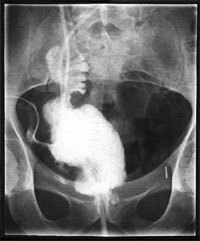by
Joan Trombetti, Writer | October 01, 2007

This is an X-ray
of a patient who
underwent a cystectomy
(removal of the bladder)
followed by the
creation of a
new bladder.
Cancer specialists and researchers are tackling an ongoing controversy about what is the best way to treat an aggressive form of bladder cancer - immediate radical surgery or a more conservative initial approach using immunotherapy. Dr. Girish Kulkarni and researchers at Princess Margaret Hospital, University Health Network (UHN) have calculated the life expectancy and the quality of life expected from the two treatments. They used a decision analysis tool - the Markov model - a first for this form of bladder cancer.
Conclusions
Researchers demonstrated that younger patients with high-risk T1G3 bladder had a higher LE and QALE with immediate cystectomy. The decision to pursue immediate cystectomy versus conservative therapy should be based on discussions that consider patient age, co-morbid status, and an individual's preference for particular postcystectomy health states. Patients over the age of 70 or those who place high value on sexual function, gastrointestinal function, or bladder preservation may benefit from a more conservative initial therapeutic approach.
Cystectomy, the surgical removal of the bladder, is considered an excellent treatment to cure this form of bladder cancer. In some cases, a new bladder is fashioned from part of the bowel. In others, an opening is created to collect urine in a pouch outside the body. Immunotherapy uses bacillus Calmette-Guerin (BCG; the tuberculosis bacterium) to treat cancer cells directly in the bladder and avoids the need for a major operation. BCG stimulates an immune response that diminishes the risk of tumor recurrence and/or progression. The researchers compared the pros and cons of each treatment in their model.
The findings demonstrate that patients under the age of 60 who opt for immediate surgery can live longer with a higher quality of life than if they had chosen the more conservative option. On the other hand, the better choice for patients over age 70 with other health issues or for those who place a high value on retaining sexual function and avoiding other side effects of surgery that may impair quality of life was the more conservative initial approach using immunotherapy.
More importantly, the study identified the major quality of life factors that should be discussed with patients when choosing between these treatment options.
According to the researchers, their findings highlight the trade off that exists when deciding between radical surgery and a more conservative approach to treating this pre-invasive form of bladder cancer. "The results of this study should help urologists to discuss the balance between quantity and quality of life, particularly with patients aged 60 to 70 years," says PMH surgical oncologist Dr. Antonio Finelli, a co-investigator in the study. He feels that what may appear to be the most suitable treatment initially may not be the case when you consider other health issues and how well an individual will cope with effects of surgery that reduce their quality of life.
The research was supported in part by the Canadian Institutes of Health Research and the National Cancer Institute of Canada.
